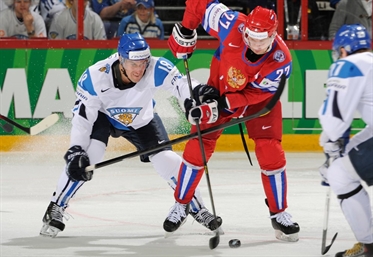Russia and Finns: who wins?
Russia and Finns: who wins?
IIHF writers debate 2014’s most intriguing QF

 When Finland last played Russia in IIHF competition, the Finns won 3-2 at the 2013 IIHF Ice Hockey World Championship. Who will prevail this time. Photo: Richard Wolowicz / HHOF-IIHF Images
When Finland last played Russia in IIHF competition, the Finns won 3-2 at the 2013 IIHF Ice Hockey World Championship. Who will prevail this time. Photo: Richard Wolowicz / HHOF-IIHF Images
That’s what IIHF.com writers Slava Malamud and Lucas Aykroyd debated before the 16:30 quarter-final puck drop at the Bolshoy Ice Dome.
Why Russia will win: Slava Malamud
Quite simply, because Russia is a superior team, and not just on paper. As a matter of fact, some of the Red Machine’s biggest “paper tigers” have not been all that impressive, individually, so far.
The perennial NHL goal king Alexander Ovechkin, after scoring with his first shot on his first shift in Sochi, has been consistently missing the broad side of the proverbial bar since. This is especially peculiar when you consider that “Ovi” is also habitually among the NHL’s leaders in shots on goal. Yevgeni Malkin has struggled to find chemistry with Ovechkin ever since that first game against Slovenia. And the scary-looking Russian power play units haven’t delivered against patently weak opposition.
But for all that, Russians still find ways to win. They overpowered Slovenia, they played a thriller against the United States which (as they will argue) they should have won in regulation, they survived the thoroughly unimpressive Slovakia game, they found enough energy, self-control and luck to put away Norway.
This is Zinetula “Coach Bill” Bilyaletdinov to a tee. He plays for results, esthetics and style be damned. This is the reason he hasn’t benched (and never will) his brilliant but implosion-prone winger Alexander Radulov. For all his tendencies to make bone-headed plays, Radulov is a player who gets results, as he demonstrated in the game against Norway.
This is also why Coach Bill plays a version of the neutral zone trap, which is really anathema when you consider Russia’s history and the names on this roster. This is the type of game that ensured the high-powered Americans never managed to consistently get even-strength goal-scoring chances against Russia and were for the most part limited to shots from the outside. This is also why Russia hasn’t allowed an even-strength goal in the last three games.
Granted, Finland will not be trying to take the initiative in this game. Not against Russia, not in front of 12,000 screaming fans, not in the aftermath of what appears to have been an open season on Finnish NHL centres. Suomi will surely employ the same style they’ve employed against Russia since time immemorial. But the difference is, in the past, Russia tried to beat them with the individual brilliance of its sublimely skilled forwards. At times it worked, as it did in Nagano in 1998, in Pavel Bure’s famous five-goal performance. At what seems like every other time, it didn’t.
But Coach Bill, for all the controversy his vision has caused in Russia, will have his team playing a different type of hockey. Patience, teamwork, solid team defence and composed competence of whoever winds up tending the net (and both Semyon Varlamov and Sergei Bobrovski have been brilliant as of late, unlike, say, Tuukka Rask) and just enough offensive spark to score first and showcase the famous Russian front-running prowess – all of that should be enough to put away the undeniably pesky Finns.
Why Finland will win: Lucas Aykroyd
On paper, undermanned Finland should have little chance against Russia. They’re missing three top NHL centres in Mikko Koivu, Valtteri Filppula, and Aleksander Barkov. Even if those guys were suiting up in the quarter-final, the Finns don’t have a single scoring superstar to compete with Alexander Ovechkin, Yevgeni Malkin, Alexander Radulov, or Ilya Kovalchuk – not unless they have a time machine to bring in the 1993 version of Teemu Selanne.
The Russians have eight Olympic hockey gold medals all-time, while the Finns have zero. And of course, Russia will have a crazed home crowd supporting it at the Bolshoy Ice Dome.
But ever since Finland’s history-making 2-1 victory over the Soviet Union en route to silver at the 1988 Olympics in Calgary, this small Nordic nation has developed a habit of tripping up Russia in key situations. And it all starts with defence.
Remember Finland’s 4-0 win over Russia in the 2006 semi-finals in Turin? Or how about the 2-1 overtime victory at the 2007 IIHF World Championship (the first time the Russians ever lost in the Worlds on Moscow ice)?
Well, both victories were masterminded by the same man who brought the blue-and-white boys within a hair’s-breadth of knocking off Canada in Sunday’s round-robin closer. Coach Erkka Westerlund knows that from the first line to the fourth line, he can get his players to play disciplined hockey in all three zones, working furiously to keep the Russians to the outside and taking away time and space between the blue lines so that they can’t use their great speed and puckhandling ability.
Canada has more depth at forward and fewer defensive holes than the Russians, and yet could only muster a 2-1 overtime win over the Finns.
Meanwhile, the fact that the Russians couldn’t conjure up any regulation-time goals against Slovakia and only four versus Norway (counting an empty netter, mind you) doesn’t bode well for them.
Forwards like Tuomo Ruutu, Olli Jokinen, and Jussi Jokinen are picking up the offensive slack, elevating their games a notch above their NHL levels. Young defencemen like Sami Vatanen and Olli Maatta (four points apiece) have been stellar so far. And goalie Tuukka Rask matches or betters the physical skills of his Russian counterparts Semyon Varlamov and Sergei Bobrovski, but is also less likely to get rattled under pressure.
Watch for Finland to play a tight, patient game, grab a one- or two-goal lead, and then just let the Russians come to them.
If you see Malkin and Ovechkin trying to beat five guys by themselves in the neutral zone, refusing to ever dump it in, or Radulov and Kovalchuk taking untimely penalties, grimacing with frustration, then you’ll know that the Finns are on the verge of authoring the greatest Russian hockey nightmare since the 1980 “Miracle on Ice” loss to the Americans in Lake Placid.
Back to Overview











































